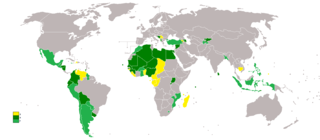| C65 | |
|---|---|
| ILO Convention | |
| Date of adoption | June 27, 1939 |
| Date in force | July 8, 1948 |
| This Convention has been "shelved". | |
| Subject | Indigenous and Tribal Peoples |
| Previous | Contracts of Employment (Indigenous Workers) Convention, 1939 (shelved) |
| Next | Migration for Employment Convention, 1939 |
Penal Sanctions (Indigenous Workers) Convention, 1939 (shelved) is an International Labour Organization Convention.
It was established in 1939, with the preamble stating:
Having decided upon the adoption of certain proposals with regard to the progressive abolition of penal sanctions for breaches of contracts of employment by indigenous workers,...
Prior to it being shelved, the convention had been ratified by 33 states.

The International Labour Organization (ILO) is a United Nations agency whose mandate is to advance social and economic justice through setting international labour standards. Founded in October 1919 under the League of Nations, it is the first and oldest specialised agency of the UN. The ILO has 187 member states: 186 out of 193 UN member states plus the Cook Islands. It is headquartered in Geneva, Switzerland, with around 40 field offices around the world, and employs some 3,381 staff across 107 nations, of whom 1,698 work in technical cooperation programmes and projects.
International human rights instruments are the treaties and other international texts that serve as legal sources for international human rights law and the protection of human rights in general. There are many varying types, but most can be classified into two broad categories: declarations, adopted by bodies such as the United Nations General Assembly, which are by nature declaratory, so not legally-binding although they may be politically authoritative and very well-respected soft law;, and often express guiding principles; and conventions that are multi-party treaties that are designed to become legally binding, usually include prescriptive and very specific language, and usually are concluded by a long procedure that frequently requires ratification by each states' legislature. Lesser known are some "recommendations" which are similar to conventions in being multilaterally agreed, yet cannot be ratified, and serve to set common standards. There may also be administrative guidelines that are agreed multilaterally by states, as well as the statutes of tribunals or other institutions. A specific prescription or principle from any of these various international instruments can, over time, attain the status of customary international law whether it is specifically accepted by a state or not, just because it is well-recognized and followed over a sufficiently long time.

The International Convention on the Protection of the Rights of All Migrant Workers and Members of Their Families is a United Nations multilateral treaty governing the protection of migrant workers and families. Signed on 18 December 1990, it entered into force on 1 July 2003 after the threshold of 20 ratifying States was reached in March 2003. The Committee on Migrant Workers (CMW) monitors implementation of the convention, and is one of the seven UN-linked human rights treaty bodies. The convention applies as of August 2021 in 56 countries.
Protection against Accidents (Dockers) Convention, 1929 (shelved) is an International Labour Organization Convention.
Protection against Accidents (Dockers) Convention (Revised), 1932 is an International Labour Organization Convention.
Invalidity, Old-Age and Survivors' Benefits Convention, 1967 is an International Labour Organization Convention.
Maintenance of Migrants' Pension Rights Convention, 1935 (shelved) is an International Labour Organization Convention.
Recruiting of Indigenous Workers Convention, 1936 is a shelved International Labour Organization Convention.
Contracts of Employment Convention, 1939 (shelved) is an International Labour Organization Convention.
Contracts of Employment Convention may refer to:
Migration for Employment Convention (Revised), 1949 is an International Labour Organization Convention for migrant workers.
Hours of Work and Rest Periods Convention, 1939 (shelved) is an International Labour Organization Convention.
Hours of Work and Rest Periods Convention, 1979 is an International Labour Organization Convention.
Contracts of Employment Convention, 1947 (shelved) is an International Labour Organization Convention.
Abolition of Penal Sanctions Convention, 1955 (shelved) is an International Labour Organization Convention.
The use of capital punishment in Italy has been banned since 1889, with the exception of the period 1926–1947, encompassing the rule of Fascism in Italy and the early restoration of democracy. Before the unification of Italy in 1860, capital punishment was performed in almost all pre-unitarian states, except for Tuscany, where it was historically abolished in 1786. It is currently out of use as a result of the adoption of the current constitution, and defunct as of 1 January 1948.
The following outline is provided as an overview of and topical guide to the United Nations:
Papua New Guinea (PNG) is a constitutional parliamentary democracy with an estimated population of 6,187,591. Police brutality, provincial power struggles, violence against women, and government corruption all contribute to the low awareness of basic human rights in the country.
International labour law is the body of rules spanning public and private international law which concern the rights and duties of employees, employers, trade unions and governments in regulating the workplace. The International Labour Organization and the World Trade Organization have been the main international bodies involved in reforming labour markets. The International Monetary Fund and the World Bank have indirectly driven changes in labour policy by demanding structural adjustment conditions for receiving loans or grants. Issues regarding Conflict of laws arise, determined by national courts, when people work in more than one country, and supra-national bodies, particularly in the law of the European Union, has a growing body of rules regarding labour rights.